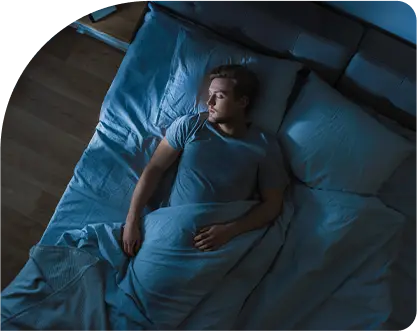Understanding the Differences Between Ramelteon and Doxepin for Insomnia
Published: 2025-03-30
 Updated: 2025-03-31
Updated: 2025-03-31
4 mins
Struggling to get a good night’s sleep? You’re not alone. Insomnia can make it tough to fall asleep, stay asleep, or wake up feeling refreshed. And when counting sheep just doesn’t cut it, many people turn to prescription sleep aids for help. But with so many options out there, how do you know which one is right for you?
Two medications that often come up in the conversation are ramelteon and doxepin. While both are used to treat insomnia, they work in very different ways – and choosing the right one depends on your specific sleep issues.
In this article, we’ll break down the differences between doxepin vs. ramelteon, exploring how they work, their effectiveness, and which one might be the better fit for your needs.
Tired of insomnia?
Explore prescription medications tailored to help you get better sleep.
Get Started
How Ramelteon and Doxepin Work
Ramelteon and doxepin may both be used to treat insomnia, but they work in completely different ways.
Ramelteon (generic Rozerem) is a melatonin receptor agonist, meaning it mimics the effects of melatonin – the hormone that regulates your sleep-wake cycle. Instead of sedating you, ramelteon helps signal to your brain that it’s time to sleep, making it particularly useful for people who have trouble falling asleep.
Doxepin (generic Silenor), on the other hand, is a low-dose tricyclic antidepressant (TCA) that works by blocking histamine receptors. Since histamine is involved in wakefulness, reducing its activity helps you stay asleep longer. Doxepin is especially effective for those who wake up frequently during the night or too early in the morning.
In short, ramelteon helps initiate sleep, while doxepin helps maintain it. Understanding these mechanisms can help you (and your doctor) determine which medication might be the better choice for your specific sleep struggles.
Effectiveness for Insomnia
When it comes to treating insomnia, the right medication depends on the type of sleep problem you’re dealing with.
Ramelteon is most effective for sleep-onset insomnia, meaning it helps people who have trouble falling asleep in the first place. Since it works by mimicking melatonin, it helps regulate the body's natural sleep-wake cycle without causing grogginess the next day. However, it doesn’t do much to keep you asleep once you drift off.
Doxepin, on the other hand, is better suited for sleep maintenance insomnia, helping people who wake up in the middle of the night or too early in the morning. Because it works by blocking histamine, it promotes longer, uninterrupted sleep – though some users report next-day drowsiness, especially at higher doses.
Clinical studies comparing ramelteon and doxepin have shown that both medications can improve sleep quality, but their effectiveness depends on the sleep issue being treated. Research suggests that ramelteon helps reduce sleep latency (the time it takes to fall asleep), while doxepin significantly reduces nighttime awakenings. Understanding these differences can help guide treatment decisions based on individual sleep patterns.
Side effects and safety considerations
Both medications have their own set of side effects and safety considerations.
Ramelteon is generally well-tolerated, with common side effects like dizziness, fatigue, and nausea. One key advantage is its low risk of dependence, making it a good option for long-term use.
Doxepin, while effective for sleep maintenance, can cause dry mouth, drowsiness, and weight gain, with some people experiencing next-day grogginess, especially at higher doses.
For older adults, doxepin’s sedative effects may increase the risk of falls or cognitive impairment, while ramelteon’s minimal next-day effects may be the safer choice. As always, discussing these factors with a doctor can help determine the best option for your needs.
Which One is Right for You?
If you struggle with falling asleep, ramelteon may be the better option since it works with your body's natural sleep-wake cycle to help you doze off faster. But if your problem is staying asleep, doxepin might be a better fit, as it helps prevent middle-of-the-night awakenings and early morning wake-ups.
Beyond sleep concerns, other factors like medical history, potential drug interactions, and personal tolerance play a role in deciding which medication is right for you. Ultimately, the best way to determine whether doxepin or ramelteon is right for you is to consult with a doctor. A healthcare provider can evaluate your sleep patterns, overall health, and any other medications you’re taking to help you make the best choice for restful, restorative sleep.
How Can Rex MD Help?
If you’re concerned about your quality of sleep, Rex MD has got you covered. Rex MD helps patients get prescription sleep-inducing medications like ramelteon or doxepin quickly, discreetly, and affordably — right from home. No in-person doctor visit needed.








 Medically reviewed by Anthony Puopolo, MD
•
Medically reviewed by Anthony Puopolo, MD
•






